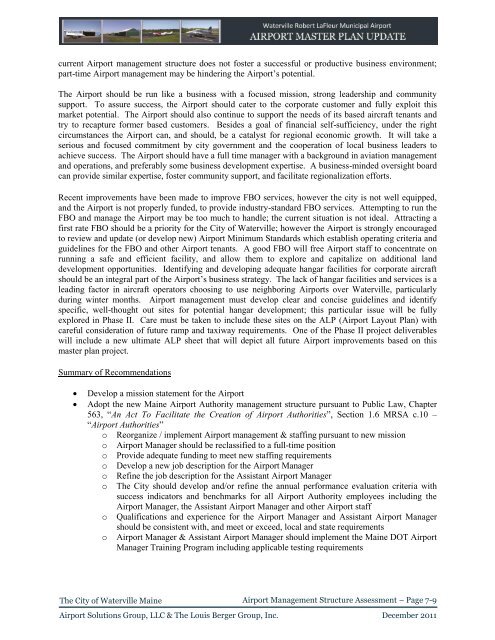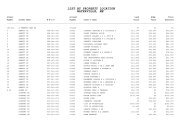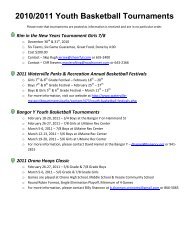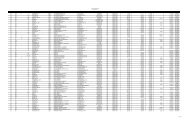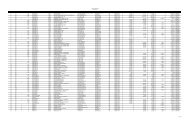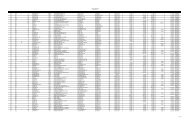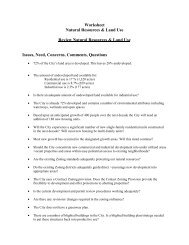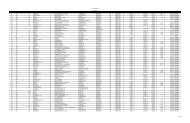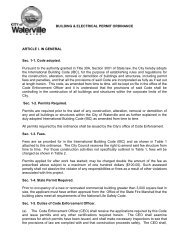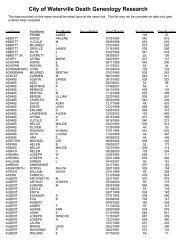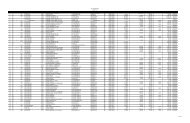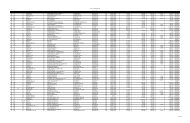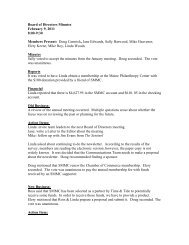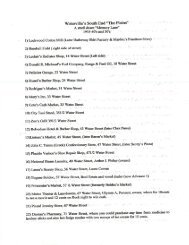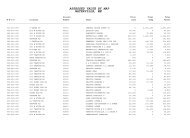Airport Master Plan 2012 - City of Waterville
Airport Master Plan 2012 - City of Waterville
Airport Master Plan 2012 - City of Waterville
You also want an ePaper? Increase the reach of your titles
YUMPU automatically turns print PDFs into web optimized ePapers that Google loves.
current <strong>Airport</strong> management structure does not foster a successful or productive business environment;<br />
part-time <strong>Airport</strong> management may be hindering the <strong>Airport</strong>’s potential.<br />
The <strong>Airport</strong> should be run like a business with a focused mission, strong leadership and community<br />
support. To assure success, the <strong>Airport</strong> should cater to the corporate customer and fully exploit this<br />
market potential. The <strong>Airport</strong> should also continue to support the needs <strong>of</strong> its based aircraft tenants and<br />
try to recapture former based customers. Besides a goal <strong>of</strong> financial self-sufficiency, under the right<br />
circumstances the <strong>Airport</strong> can, and should, be a catalyst for regional economic growth. It will take a<br />
serious and focused commitment by city government and the cooperation <strong>of</strong> local business leaders to<br />
achieve success. The <strong>Airport</strong> should have a full time manager with a background in aviation management<br />
and operations, and preferably some business development expertise. A business-minded oversight board<br />
can provide similar expertise, foster community support, and facilitate regionalization efforts.<br />
Recent improvements have been made to improve FBO services, however the city is not well equipped,<br />
and the <strong>Airport</strong> is not properly funded, to provide industry-standard FBO services. Attempting to run the<br />
FBO and manage the <strong>Airport</strong> may be too much to handle; the current situation is not ideal. Attracting a<br />
first rate FBO should be a priority for the <strong>City</strong> <strong>of</strong> <strong>Waterville</strong>; however the <strong>Airport</strong> is strongly encouraged<br />
to review and update (or develop new) <strong>Airport</strong> Minimum Standards which establish operating criteria and<br />
guidelines for the FBO and other <strong>Airport</strong> tenants. A good FBO will free <strong>Airport</strong> staff to concentrate on<br />
running a safe and efficient facility, and allow them to explore and capitalize on additional land<br />
development opportunities. Identifying and developing adequate hangar facilities for corporate aircraft<br />
should be an integral part <strong>of</strong> the <strong>Airport</strong>’s business strategy. The lack <strong>of</strong> hangar facilities and services is a<br />
leading factor in aircraft operators choosing to use neighboring <strong>Airport</strong>s over <strong>Waterville</strong>, particularly<br />
during winter months. <strong>Airport</strong> management must develop clear and concise guidelines and identify<br />
specific, well-thought out sites for potential hangar development; this particular issue will be fully<br />
explored in Phase II. Care must be taken to include these sites on the ALP (<strong>Airport</strong> Layout <strong>Plan</strong>) with<br />
careful consideration <strong>of</strong> future ramp and taxiway requirements. One <strong>of</strong> the Phase II project deliverables<br />
will include a new ultimate ALP sheet that will depict all future <strong>Airport</strong> improvements based on this<br />
master plan project.<br />
Summary <strong>of</strong> Recommendations<br />
<br />
<br />
Develop a mission statement for the <strong>Airport</strong><br />
Adopt the new Maine <strong>Airport</strong> Authority management structure pursuant to Public Law, Chapter<br />
563, “An Act To Facilitate the Creation <strong>of</strong> <strong>Airport</strong> Authorities”, Section 1.6 MRSA c.10 –<br />
“<strong>Airport</strong> Authorities”<br />
o Reorganize / implement <strong>Airport</strong> management & staffing pursuant to new mission<br />
o <strong>Airport</strong> Manager should be reclassified to a full-time position<br />
o Provide adequate funding to meet new staffing requirements<br />
o Develop a new job description for the <strong>Airport</strong> Manager<br />
o Refine the job description for the Assistant <strong>Airport</strong> Manager<br />
o The <strong>City</strong> should develop and/or refine the annual performance evaluation criteria with<br />
success indicators and benchmarks for all <strong>Airport</strong> Authority employees including the<br />
<strong>Airport</strong> Manager, the Assistant <strong>Airport</strong> Manager and other <strong>Airport</strong> staff<br />
o Qualifications and experience for the <strong>Airport</strong> Manager and Assistant <strong>Airport</strong> Manager<br />
should be consistent with, and meet or exceed, local and state requirements<br />
o <strong>Airport</strong> Manager & Assistant <strong>Airport</strong> Manager should implement the Maine DOT <strong>Airport</strong><br />
Manager Training Program including applicable testing requirements<br />
The <strong>City</strong> <strong>of</strong> <strong>Waterville</strong> Maine<br />
<strong>Airport</strong> Management Structure Assessment – Page 7-9<br />
<strong>Airport</strong> Solutions Group, LLC & The Louis Berger Group, Inc. December 2011


